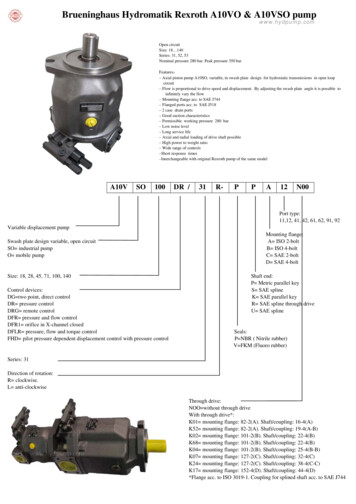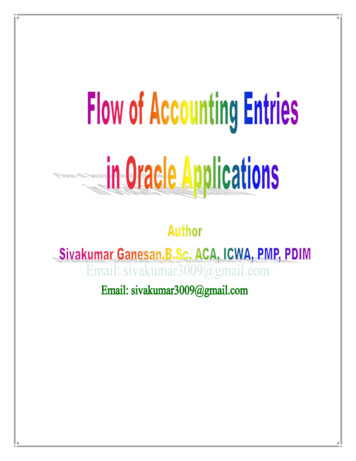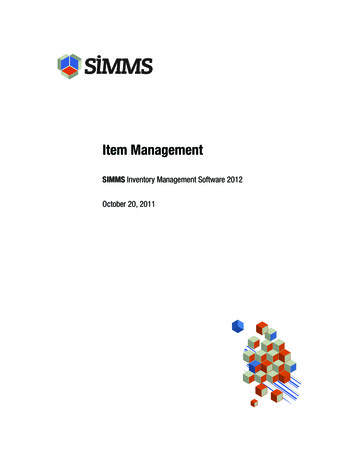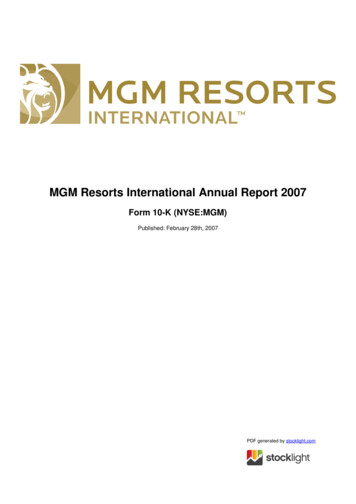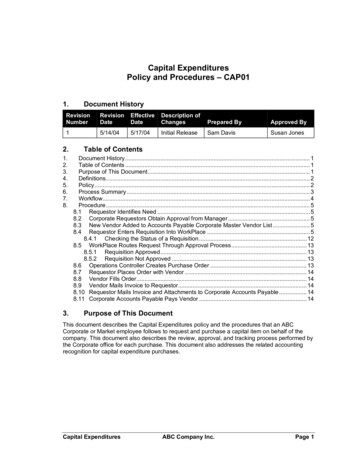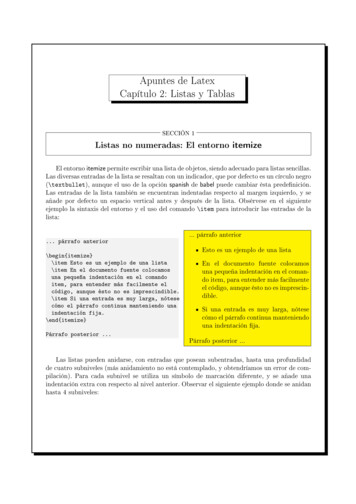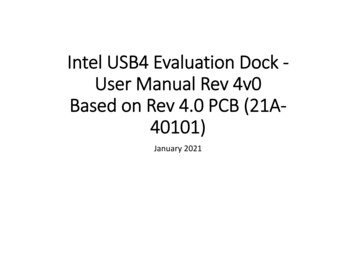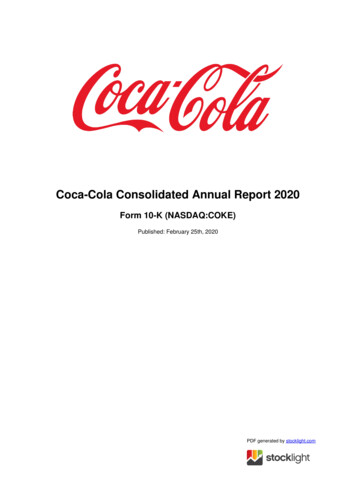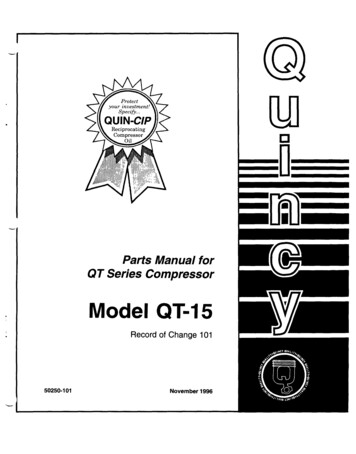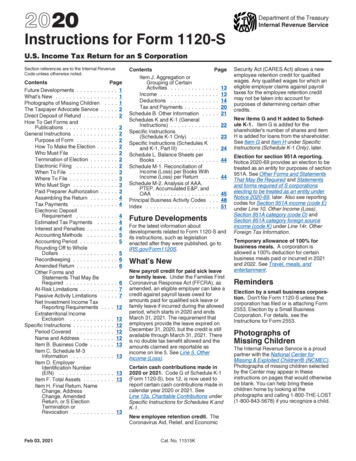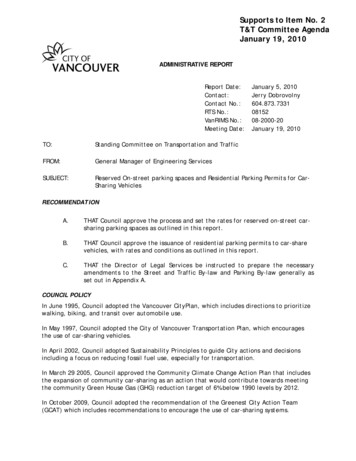
Transcription
Supports to Item No. 2T&T Committee AgendaJanuary 19, 2010ADMINISTRATIVE REPORTReport Date:Contact:Contact No.:RTS No.:VanRIMS No.:Meeting Date:January 5, 2010Jerry Dobrovolny604.873.73310815208-2000-20January 19, 2010TO:Standing Committee on Transportation and TrafficFROM:General Manager of Engineering ServicesSUBJECT:Reserved On-street parking spaces and Residential Parking Permits for CarSharing VehiclesRECOMMENDATIONA.THAT Council approve the process and set the rates for reserved on-street carsharing parking spaces as outlined in this report.B.THAT Council approve the issuance of residential parking permits to car-sharevehicles, with rates and conditions as outlined in this report.C.THAT the Director of Legal Services be instructed to prepare the necessaryamendments to the Street and Traffic By-law and Parking By-law generally asset out in Appendix A.COUNCIL POLICYIn June 1995, Council adopted the Vancouver CityPlan, which includes directions to prioritizewalking, biking, and transit over automobile use.In May 1997, Council adopted the City of Vancouver Transportation Plan, which encouragesthe use of car-sharing vehicles.In April 2002, Council adopted Sustainability Principles to guide City actions and decisionsincluding a focus on reducing fossil fuel use, especially for transportation.In March 29 2005, Council approved the Community Climate Change Action Plan that includesthe expansion of community car-sharing as an action that would contribute towards meetingthe community Green House Gas (GHG) reduction target of 6% below 1990 levels by 2012.In October 2009, Council adopted the recommendation of the Greenest City Action Team(GCAT) which includes recommendations to encourage the use of car-sharing systems.
Reserved On-street parking spaces and Residential Parking Permits for Car-Sharing Vehicles2Council Policy is to use parking pricing to improve turnover of street parking for short-termuse and to set meter rates to reflect market demand.Residential permit fees are reviewed periodically as part of an overall annual fee review. It isCouncil policy that fees should either recover the full cost of providing services or provide acharge that is equivalent to competitive charges where the fee is of a market nature.PURPOSE/SUMMARYThe purpose of this report is to seek Council authority to make changes to the City ofVancouver’s on-street parking policies in order to support car-sharing. This reportrecommends the introduction of a fee for on-street reserved spaces for car-sharing vehiclesand that Residential Parking Permits (RPP) be provided to car-sharing vehicles to park in theresidential areas. These initiatives are consistent with the goals of Greenest City Action Team(GCAT)BACKGROUNDCar-sharing is a service that provides its members with access to a fleet of vehicles on anhourly basis. Members reserve a vehicle online or by phone, and pick up the vehicle from avariety of locations within the Lower Mainland. Car-sharing has proven to be an effective wayto gain access to a vehicle without the obligations and ongoing costs of owning andmaintaining a car. Instead of owning one or more vehicles, a household or business accesses afleet of shared-use vehicles including cars, pick-up trucks and vans. It encourages the use ofsustainable modes of transportation such as walking, cycling and transit for most everydaytrips, but gives access to a vehicles on an as needed basis. In Vancouver, car-sharing vehiclescan be found in residential neighborhoods, as well as in the Downtown core. The term carsharing is the same as “Shared-Vehicle” as defined in the Parking by-Law.Benefits of Car-SharingAccording to Transport Canada, car-sharing members emit an average of 0.32 metric tones ofCarbon Dioxide equivalents, or about one tenth of that emitted by the average driver. Thereare *numerous studies from US and Canada that consistently support the benefits of carsharing. A sample of those study results are listed below: *29% of car-sharing participants sold a vehicle after joining a car-sharing program;61% members delayed or had forgone a vehicle purchase;Members reduced their Vehicle Miles Traveled (VMT) by 43%;Car-Share users generate 90% less carbon output than a private vehicle owner;One car-share vehicle replaces up to 23 cars from the roads; andPrivate vehicles are used 2% of the time, whereas car-sharing vehicles are used 50% ofthe time.Millard-Ball, Murray, Schure, Fox, Burckhardt (2005), Car-Sharing Where and How it Works, Transportation Research Board
Reserved On-street parking spaces and Residential Parking Permits for Car-Sharing Vehicles3Car-Sharing in VancouverCurrently there are three car-sharing companies in Vancouver: Cooperative Auto Network(CAN), Zipcar and CityFlitz. In addition to these companies, there is the possibility that morecar-sharing companies could enter the Vancouver market in the future. Although theseorganizations can be accessed by the public, they are not publicly accountable for theirservice levels or rates. As such, the perceived public benefits of these services must bebalanced against any public subsidies or other support to their operations.Cooperative Auto Network (CAN) was the first car-sharing organization in Vancouver; itstarted its operation in 1997, providing residents with a sustainable and cost-effectivealternative to owning personal vehicles. Since CAN’s inception, the City has provided CANvehicles with Residential Parking Permit (RPP) decals for 33 per year, allowing car-sharingvehicles to park in any RPP zone. The City also provides CAN with seven reserved on-streetparking spaces at no cost to CAN. This was intended to help the first car-sharing companyestablish its operation in Vancouver and to give car-sharing vehicles a visual presence on thestreets. CAN currently operates around 225 car-sharing vehicles in the Lower Mainland. CANwishes to continue having RPP decals and would like to have more reserved on-street parkingspaces for its vehicles.Zipcar is a newer car-sharing organization that established operations in Vancouver in early2007. The City has also provided RPP decals to Zipcar vehicles in the interim, while a formalpolicy is developed, so that its members can park in any of the RPP zones. Zipcar currentlyoperates around 125 car-sharing vehicles in the Lower Mainland. Zipcar is interested in havingreserved on-street spaces for its vehicles.CityFlitz started their operation in Vancouver in June 2009 and currently has just six vehiclesavailable for sharing. CityFlitz uses their vehicles for commercial advertising and membersmust drive at least 25 kilometers per booking, but vehicles cannot be driven outside of theLower Mainland. Staff contacted CityFlitz to enquire if they would be interested inparticipating in the RPP or on-street reserved spaces programs. Currently, they are notinterested in any of the programs.DISCUSSIONNumerous City policies and programs have helped grow sustainable modes of transportationsuch as walking, cycling, transit and car-sharing. In order to further encourage car-sharing inVancouver, staff recommends the introduction of a process to allocate on-street reservedspaces for car-sharing vehicles and that Residential Parking Permits (RPP) be provided to carsharing vehicles to park in the residential areas.On-Street Reserved Spaces For Car-sharing VehiclesIn most areas, car-sharing companies park their vehicles in off-street parking lots. The City iscurrently assisting car-sharing by requiring all rezoning applicants to provide off-street carsharing spaces and vehicles in their developments at no cost to the car-sharing companies.Staff believes that parking and storage of vehicles is best provided for in off-street lots whileon-street spaces should only be considered as a supplement to off-street parking.Currently, CAN has seven reserved on-street parking spaces. To be fair to all car-sharingorganizations, staff recommends that reserved on-street spaces be made available to allinterested car-share organizations, and that a market fee be charged for these spaces. Theintention of this program is to determine how many spaces, overall citywide, can be allocated
Reserved On-street parking spaces and Residential Parking Permits for Car-Sharing Vehicles4to car-sharing in the context of other demands for public street space. It is not the intentionof this program to entirely meet the needs of all the car-sharing companies that exist now orin the future by providing space on-street to park all of their vehicles.Dedicating sections of streets for specific users, such as car-sharing companies is similar tothe zones that the City provides for taxis, tour buses, valets, and commercial loading.However, in this case, staff are recommending that the space be dedicated to a specific carsharing company so that the space can be used to park one specific vehicle. Since this willmake the space unavailable for other users, and will apply at all times of the day, staff arerecommending that the City charge a fee for the space.When determining a fee for the exclusive use of street space, staff reviewed current Councilpolicies on parking, street use and fees as well as the market prices for commercial,residential and metered parking. The car-sharing companies were also consulted about theimpact the fees would have on their operation so that staff could recommend a fee thatsupported car-sharing consistent with Council policy.Staff recommend that for on-street reserved spaces in residential areas, and not on meteredstreets, car-sharing companies be charged a fee equal to the off-street market rates forresidential parking. This is intended to match the approximate price that a resident wouldpay to park their vehicle in an underground space in their apartment building. The proposedrates range from 300 to 1320 per year, as shown in Table-1, depending upon the location ofthe space in the City.Table-1 –Annual On-street Reserved Space Parking Rates for Car-Sharing Vehicles inResidential AreasAnnual Rate Excluding TaxResidential (Non-Metered) AreasDowntown and Southeast False CreekMetro Core (Except Downtown and Southeast False Creek)Areas outside of Metro Core 1320 660 300Though staff will endeavour to allocate spaces for car-sharing vehicles that are not on blockswith parking meter spaces, there is a possibility that some car-sharing spaces will displaceparking meter spaces. For on-street reserved spaces in metered zones, fees are recommendedto be based on the meter revenue that would have been collected by the City. This processwill support car-sharing vehicles by giving them spaces in high profile locations while at thesame time not have any negative impact on the City’s operating budget. Table-2 shows thevalue of metered spaces in different rate zones around the city.As spaces are allocated in this program, the annual price to the car-share companies will bebased on whether the space is in an area with parking meters or in a residential area withoutparking meters. Each space will be allocated for a two year term and the price will bereviewed on an annual basis. This will ensure that the correct rate is being charged andaccount for the situation where a parking meter gets added to a block that previously wasresidential only.
Reserved On-street parking spaces and Residential Parking Permits for Car-Sharing Vehicles5Each reserved on-street car-sharing space will be designated with curb side signage and willbe designed to include a bike rack so that users can cycle to pick up the vehicle. Moreinformation on the Implementation Plan and Financial Implementations is available in thecorresponding sections of this report.Table-2 Examples of Annual Rates for Reserved Car-Sharing Spaces on Metered SpacesMeter Rate(Per Hour) 1 2 4 6Annual Lost Meter Revenue(66% usage) 3,132 6,264 12,528 18,792Residential Parking Permit (RPP) Decals for Car Sharing VehiclesIn addition to allocating reserved on-street spaces for car-sharing vehicles, it is recommendedto formalize the process for selling Residential Parking Permits (RPP) decals to car-sharingcompanies. This would give the car-sharing vehicles the same access to neighbourhoodparking that is given to residents’ personal vehicles.RPP decals are issued in areas with a high demand for on-street residential parking. Residentswho live in the RPP zones purchase RPP decals which enable them to park their vehicles closeto their homes. Vehicles parked in a specific RPP zone without a valid City issued decal forthat zone can be ticketed by City staff. Table-3 shows the annual Residential Parking Permit(RPP) rates for various city areas.Table-3 Annual Rate for Residential Parking Permit (RPP) ZonesAnnual RPP RatesArea(Excluding Tax)West End, Robson North and other parts of Downtown 64.76VGH, Oak West and Fairview 47.62Other areas, as shown in Map1.0 32.38Staff is recommending issuing RPP decals for car-sharing vehicles, which will enable a carsharing vehicle to park in any of the 20 RPP zones. These decals would not only allowresidents of RPP zones to access and park car-sharing vehicles close to their homes but wouldalso allow any member of car-sharing organization to park a car-sharing vehicle in any of theRPP zones. Because this privilege is not available to regular RPP decal holders, and is beingrecommended exclusively to encourage car-sharing, staff recommend issuing RPP decals tocar-sharing vehicles at the highest annual RPP rate of 64.76 per vehicle. The RPP decals aredifferent from reserved on-street spaces as the decals do not guarantee parking in any onespecific location.Facilitating the use of car-sharing vehicles in RPP areas has the potential to decrease thedemand for street parking as residents are provided with an alternative to owning (and
Reserved On-street parking spaces and Residential Parking Permits for Car-Sharing Vehicles6needing to park) their own vehicle. Staff believes this initiative would significantly encouragecar-sharing by increasing the convenience of using the vehicles.ENVIRONMENTAL IMPLICATIONSProviding reserved on-street car-sharing spots and allowing car-sharing vehicles to park in RPPzones will make these vehicles more accessible to residents and will increase visibility for carsharing. Both measures are expected to encourage sustainable modes of transportation suchas walking, cycling and transit by making it easier for residents to forgo ownership of personalvehicles.Several Canadian and American cities such as Toronto, Victoria, Arlington, Seattle, Portlandand Washington DC have either started pilot programs or established ongoing programs forreserved on-street car-sharing spaces. The City of Arlington has evaluated the results of itspilot program and their studies show that the introduction of the on-car-sharing programresulted in a 68 ton reduction of carbon dioxide per on-street parking space per year. While itis difficult to calculate the Vehicles Miles Travelled (VMT) and Green House Gas (GHG)reductions expected from the provision of on-street reserved car-sharing spaces forVancouver, the experience of Arlington shows that the benefits could be significant.IMPLEMENTATION PLANOn-street reserved spaces would be allocated over the spring and summer of 2010. In order toinclude any new car-sharing organizations in Vancouver and to accommodate new street usesover time, all spaces would be allocated for a two-year term. After two years, the spaces willbe reviewed and re-allocated if necessary.It is anticipated that up to 60 reserved on-street spaces will be allocated, city-wide, in thefirst year of this program. Of those spaces, up to 10 spaces may be on blocks with meteredspaces. Although it is anticipated that there will be some incremental growth in the programover time, if the demand for on-street reserved spaces increases beyond the scope presentedin this report, staff will re-evaluate the program and report back as necessary.Residential Parking Permit (RPP) decals would be issued immediately after the enactment ofthe by-law.FINANCIAL IMPLICATIONSTable-4 shows the expected financial implications of the program. Calculations are based onthe following estimates: RPP decals issued to approximately 50% of the vehicles owned both by CAN and Zipcar:In the residential areas of the city 20 spaces would be allocated in Downtown, 20spaces in Metro Core outside of Downtown and 20 spaces would be allocated outsideof Metro Core for reserved on-street car-sharing vehicles;Bike racks will be installed every year near the reserved car-sharing vehicle spaces;andSpaces allocated in metered zones are revenue neutral to the City.
Reserved On-street parking spaces and Residential Parking Permits for Car-Sharing VehiclesTable-4 Expected Revenue and Use of Funds2010 (May-December)Residential Parking Permit 5,900RevenueOn-street Reserved Parking 45,600RevenueTOTAL REVENUE 51,500Sign Installation CostBike RacksOn-going Staff CostsTOTAL EXPENDITURENET REVENUE7Annual 5,900 45,600 51,500( 15,000)( 7,500)( 5500)( 31,000)( 51,500)( 13,000)( 31,000)( 51,500) 0 0The car-sharing parking program is intended to be revenue neutral. The on-street fees andthe RPP permit fees will generate funds to pay for the program costs. The bike rack part ofthe program will be sized to spend the money generated by the program over and above otherrequired costs.The difference between the 2010 budget and the annual, on-going budget isthat initial funds will be required in the first year to install signs and establish all of thereserved parking spaces. In future years, less money will be needed to add or replace signs,but it will take a number of years to reach the full capacity of bike racks at all locations. Theexpenditure budget for both sign and bike racks is to provide for up front costs as well as ongoing maintenance.Some staffing costs will be needed in order to implement this program and then to sustain iton an on-going basis. This funding will be combined with funding for other parking programsto provide temporary help to renew RPP decals, find new reserved spaces and renewagreements for on-going reserved spaces.CONSULTATIONAccess to Residential Parking Permits (RPP) and to the reserved on-street parking spaceprogram for car-sharing vehicles was developed in collaboration with car-sharingorganizations. Staff determined the RPP rates for car-sharing vehicles and for on-streetreserved car-sharing parking spaces in consultation with Cooperative Auto Network (CAN) andZipcar and both organizations have expressed that the parking rates are reasonable and canbe accommodated in their business plan.CONCLUSIONAllowing car-share vehicles to park in RPP zones and allocating reserved on-street parkingspaces for car-sharing vehicles will make car-sharing vehicles more accessible and provide amore visible transportation alternative. This will further Council’s goal of supporting carsharing and lead to increased use of this form of transportation. All these actions areconsistent with the City’s Transportation polices and the goals of the Greenest City ActionTeam.*****
APPENDIX APAGE 1 OF 5Shared vehicle organizationBY-LAW NO.A By-law to amend Parking By-law No. 6059 with regard tothe definition of shared vehicle organizationTHE COUNCIL OF THE CITY OF VANCOUVER, in public meeting, enacts as follows:1.In section 2 of the Parking By-law, Council:(a)from the definition of “Shared Vehicle”, strikes out “an”, and substitutes “ashared vehicle”; and(b)after the definition of “Shared Vehicle”, adds:“Shared Vehicle Organization means a legal entity whose principal businessobjective is to provide its members, for a fee, with a car-sharing service bywhich such members have access to a fleet of shared vehicles which they mayreserve for use on an hourly basis, and which the City Engineer has approved.”2.A decision by a court that any part of this By-law is illegal, void, or unenforceablesevers that part from this By-law, and is not to affect the balance of this By-law.3.This By-law is to come into force and take effect on the date of its enactment.ENACTED by Council thisday of, 2010MayorCity Clerk
APPENDIX APAGE 2 OF 5BY-LAW NO.A By-law to amend Street and Traffic By-law No. 2849regarding shared vehicle parking and miscellaneous mattersTHE COUNCIL OF THE CITY OF VANCOUVER, in public meeting, enacts as follows:1.This By-law amends the indicated provisions of the Street and Traffic By-law.2.To section 3, after the definition of “Service Vehicle”, Council adds:‘ “Shared Vehicle” means a four-wheeled automobile, van, or pick-up truck owned andoperated by a shared vehicle organization;“Shared Vehicle Organization” means a legal entity whose principal business objectiveis to provide its members, for a fee, with a car-sharing service by which such membershave access to a fleet of shared vehicles which they may reserve for use on an hourlybasis, and which the City Engineer has approved.’3.Council repeals the title “RESIDENTIAL PERMIT PARKING” that appears before section23.1, and substitutes “RESIDENTIAL AND SHARED VEHICLE PARKING”.4.Council repeals section 23.1, each time it appears, and substitutes:“23.1 If:(a)the City Engineer designates any street or part of a street for theparking only of:(i)vehicles belonging to residents who live in a particular area ofthe city, and(ii)shared vehicles,or any one or more of such classes of vehicles;(b)the City Engineer identifies any such street or part of a street by postingon it signs indicating a prohibition on parking except for a vehicle thatdisplays a permit authorizing parking in that area; and(c)a person driving a vehicle that displays such a permit complies with allother parking restrictions that apply in that area;such a person may park that vehicle on any such street or part of a street.”
APPENDIX APAGE 3 OF 55.After section 23.1A, Council adds:“23.1B If:(a)the City Engineer designates any street or part of a street for thereserved parking only of shared vehicles;(b)the City Engineer identifies any such street or part of a street by postingon it signs indicating a prohibition on parking except for a sharedvehicle marked as a shared vehicle and bearing the name of the sharedvehicle organization that owns it; and(c)a person driving a shared vehicle that displays such a permit complieswith all other parking restrictions that apply in that area;such a person may park that shared vehicle on any such street or part of astreet.”6.Council repeals section 23.4, and substitutes:“23.4 The annual fee for a permit authorizing parking under section 23.1(a)(i) or (ii)is:(a)(b)(c)23.5for parking of each vehicle belonging to aresident on streets located in the West Endand Robson North areas, as defined inSchedule D to this By-law 64.76for parking of each vehicle belonging to aresident on streets located in the area ofthe city bounded on the north by 6th Avenue,on the east by Cambie Street, on the south by19th Avenue from Cambie Street to Oak Street,and by Douglas Crescent, Wolfe Avenue andMarpole Avenue from Oak Street to GranvilleStreet, and on the west by Granville Street,except for the 500 and 600 blocks of West 18thAvenue and West 19th Avenue 47.62for parking of each vehicle belonging to aresident on streets located in all otherareas of the city 32.38The annual fee for a permit authorizing parking under section 23.1(a)(iii) foreach shared vehicle in all areas of the city, payable to the city on May 1, is 64.76.
APPENDIX APAGE 4 OF 523.6The annual fee for a permit authorizing reserved shared vehicle parking undersection 23.1B for each shared vehicle, payable to the city on May 1, is:(a)(b)(c)(d)Downtown area as described in theParking By-law for non-meteredreserved shared vehicleparking space 1,320.00Metro Core, being the area west ofClark Drive, north of 16th Avenue,east of Burrard Street, and south ofBurrard Inlet, except the DowntownArea and Southeast False Creek fornon-metered reserved shared vehicleparking space 660.00Remainder of city outside Metro Corefor non-metered reserved shared vehicleparking space 300.00For reserved shared vehicle parking space that the city would otherwisemeter, that sum which is equal to the maximum annual revenue theparking space would have generated if metered during the samecalendar year in which the city issues the reserved shared vehicleparking permit.23.7 The annual fee for each vehicle set out in each of sections 23.4, 23.5, and 23.6 isexclusive of all sales, goods and services, harmonized, and other taxes imposed from time totime under federal or provincial law.”
APPENDIX APAGE 5 OF 57.A decision by a court that any part of this By-law is illegal, void, or unenforceablesevers that part from this By-law, and is not to affect the balance of this By-law.8.This By-law is to come into force and take effect on the date of its enactment.ENACTED by Council thisday of, 2010MayorCity Clerk
APPENDIX BPAGE 1 OF 1
Zipcar is a newer car-sharing organization that established operations in Vancouver in early 2007. The City has also provided RPP decals to Zipcar vehicles in the interim, while a formal policy is developed, so that its members can park in any of the RPP zones. Zipcar currently operates around 125 car-sharing vehicles in the Lower Mainland.
